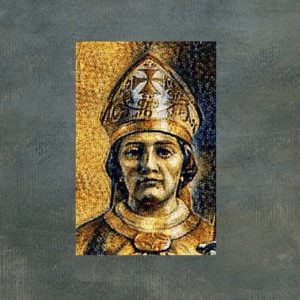Saint Thorlak: A Sermon by a Lutheran Minister from Denmark
Gratefully posted with permission of the author, Pastor René Yde – Denmark.
Dearly Beloved,
When we gather in church, we offer the sacrifice of thanksgiving for the praise and worship of God alone, but tonight we also have a kind of themed service because we celebrate the mass in memory of and in honor of an Icelandic saint, namely Saint Thorlak.
Why should we celebrate an Icelandic saint tonight? Because I have the vision for our community that over time we will celebrate all the Nordic saints, not only those from Denmark, but also from Sweden and Norway and therefore also from Iceland. We must get to know them and reflect on them as examples of lived Christian lives.
Saint Thorlak was born in 1133 in Iceland. He was made a deacon when he was fifteen, and ordained a priest when he was only eighteen. When he was twenty years old, he was sent to France and later to Lincoln in England, where he studied for six years. Here he showed astonishing abilities for theological study. He immersed himself in the Bible and in the writings of the Church Fathers with astonishing perseverance. Here he also got to know monastic life and became an Augustinian monk and since then he adhered to the rule with a stubborn tenacity. He returned to Iceland and lived the next six years as a parish priest. In 1168 he entered the first Augustinian monastery in Iceland and later became its abbot. When he was forty years old, he became bishop of the southern of Iceland’s two dioceses and he died on December 23, 1193, aged 60 years.
(For us Danes, who are not under the supremacy of the Roman pontiff, it is a piquant little detail that Saint Thorlak was not canonized by the bishop of Rome, but by the Icelandic Althing. It shows that a canonization may well be a local matter.)
How was Thorlak like as a person? Thorlak was a bookworm who could already read and write as a small child. He was shy and reluctant towards people. He was silent and withdrawn and could seem strange and dismissive if one tried to talk to him. In addition, he was a very complex personality with opposite and seemingly contradictory character traits.
On the one hand, Thorlak was incredibly rigid and regular of personality. To him, things were either right or wrong. He saw things exclusively in black and white. He was an unwavering Christian idealist and judged the world and men based on the ideals of the Christian religion and the revealed law of God in the Bible and in the teachings of the Church. This led to him becoming very unpopular among the priests and the Icelandic nobles.
On the other hand, Thorlak was of a very mild and gentle disposition. He was humble and loving and had a great deal of compassion for his fellow Christians, to whom he showed a great deal of responsibility because of his holly office. He had a big heart for the poor and the weak and for those who had transgressed against the law of God. It even happened that Thorlak, as the confessor, imposed a really hard and severe penance on the sinner in the confession, after which he, as bishop, freed him from the penance and took it upon himself. This made the laity take him to its heart and greatly appreciated him as a pastor and bishop.
Thorlak was in fact a shining example of the excellent pastoral and Christian principle that says: “Strict in theory and mild in practice.” We Christians must be ruthless in our judgment of thoughts and ideas and judge them strictly on the basis of the revealed truth in the Bible and in the tradition of the Church, but we must be compassionate and gracious and gentle towards people, for that is how our Lord Jesus wants us to be.
How can an individual have such a great degree of opposite character traits as Saint Thorlak? That can actually be well explained, because it is overwhelmingly likely that Saint Thorlak was autistic.
Autism is a particularly congenital condition in which one has difficulty functioning in social contexts and is not very good at discerning social conventions and norms between people. One often has a rigid and strict approach to life and one may have difficulty functioning in the ordinary social interactions.
If Saint Thorlak had autism, which is most likely, then he is a good role model for people who are born with this special challenge and can for them be an example that even an autist can be saved and attain holiness and live in God’s love and grace.
Even if you do not have autism, you can use Saint Thorlak as a role model. He was born into the world with a special and difficult challenge. He was autistic and he had his special problems and challenges to contend with, but he overcame them by the grace of God. He sought the peace in the name of Jesus despite his social disability and turned his shortcomings into a love of the truth and of our Lord Jesus. Thorlak sought and found the forgiveness and grace that flows to us from the Holy Cross of Christ. He humbled himself, fought his sins and hardships, and found the saving and sanctifying love of Christ in the preaching and means of grace of the Church.
There is a word that says, “Every saint has a past and every sinner has a future.” Each of us has his special challenges and struggles. We are all born with special faults in nature that we are called to overcome by the grace of God. Each of us must fight against this or that sin or this or that particular challenge in our personality or this or that external circumstance. We are different also on the spiritual level, but the path is the same for everyone. We must all indulge in the grace from Calvary and be filled with the love of God through faith.
Saint Thorlak had autism, but he overcame this particular challenge of his and became a Christian shepherd for the Icelandic people, lovingly guiding them on their journey with God. You have your special challenges and I have mine. Let us together remember Saint Thorlak as a Christian man with a large and heavy cross to bear, but who bore it in love for the crucified and risen Savior. Let us take Saint Thorlak as a model for our Christian life and know that it is not our external or internal circumstances that determine whether we are saved, but only our will to belong to Christ and his church.
I will end my sermon by reading the antiphon that was sung in the medieval office on Saint Thorlak’s day:
“O shepherd of Iceland, you who are the father of truth, the pillar of permanence, the reflection of purity, you who soothe grief and is hope for the despairing, you led us to the meadows of our heavenly Fatherland.”
Glory be to the Father, and to the Son, and to the Holy Spirit, as it was in the beginning, is now, and ever shall be, world without end. Amen.


